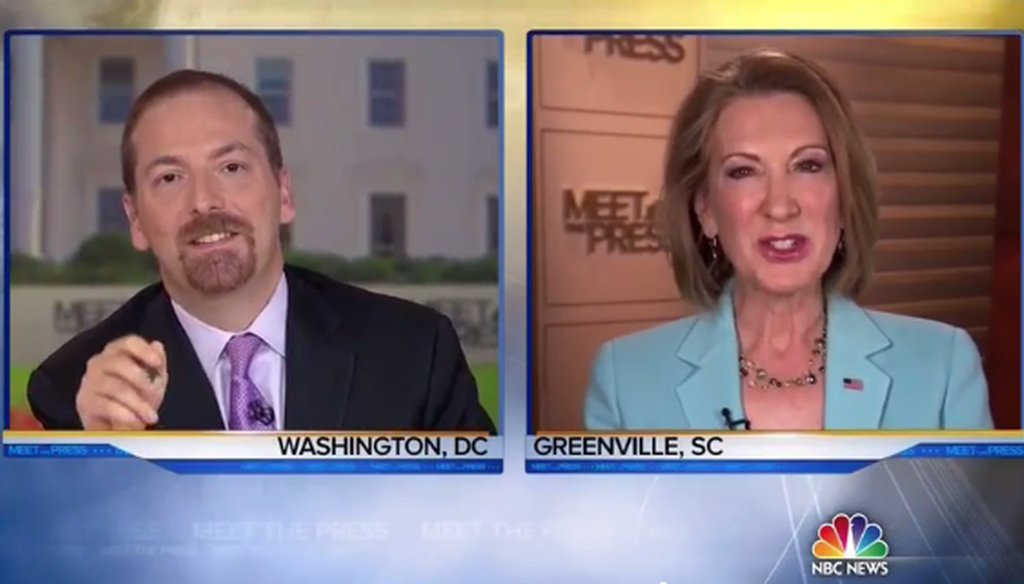Stand up for the facts!
Our only agenda is to publish the truth so you can be an informed participant in democracy.
We need your help.
I would like to contribute

Carly Fiorina on "Meet the Press" May 10, 2015.
A trio of Republican presidential hopefuls officially entered the 2016 race last week, which meant a requisite trip to the Sunday news shows.
There, all were asked to defend past controversies.
On Fox News Sunday, Ben Carson explained his past comparison of the U.S. government to Nazi Germany. "What I said is that in Nazi Germany, most of those people didn't believe in what Hitler was doing, but did they say anything? They did not," Carson said. "That's what allowed people to progress to that point."
Face the Nation host Bob Schieffer asked Mike Huckabee about an infomercial he made for a diabetes cure that, Schieffer said, "is simply not supported by the medical community."
"If that's the worst thing somebody can say to me is that I advocated for people who have diabetes to do something to reverse it and stop the incredible pain of that, then I am going to be a heck of a good president," Huckabee said.
In an interview with NBC’s Chuck Todd, Carly Fiorina took on critics who accuse her of slash-and-burn tactics when she served as CEO of computer company Hewlett-Packard.
A cyber-squatter purchased the website carlyfiorina.org to highlight nearly 30,000 layoffs that occured while Fiorina led the computer giant from 1999-2005, claiming that Fiorina said in retrospect, "I would have done them all faster."
That quote is out of context. The claim rates Half True.
The layoffs figure is accurate -- Fiorina acknowledged as much in a 2006 interview -- but Fiorina wasn’t talking about all the Hewlett-Packard layoffs when she gave that quote. Fiorina was more specifically referring to her decisions to force out a small number of top-level executives, not tens of thousands of rank-and-file employees.
On Meet the Press, Todd asked Fiorina why she was fired. Fiorina used the question to rattle off her accomplishments at HP.
"What people fail to comment on is the fact we doubled the size of the company, took the growth rate from 2 percent to 9 percent," she said. "We tripled the rate of innovation to 11 patents a day and went from lagging behind to leading in every product category. We grew jobs here in the U.S. and all over the world. You can't just leave those facts out -- they are as vital to the record as the fact that yes, indeed, I had to make tough calls during tough times. Tough times that many technology companies didn't survive at all."
We were interested in Fiorina’s first claim, that under her leadership Hewlett-Packard doubled in size.
Through one lens -- revenues -- her claim is accurate. But it far from tells the entire story. We rate the claim Mostly True.
In 1999, when Fiorina became CEO, HP’s annual revenue was $42.4 billion, according to annual Securities and Exchange Commission filings. With the exception of a slight dip in 2001 (at the end of the dot-com bubble), revenue increased each year -- to $86.7 billion in 2005, the year she left. That’s a little bit more than double.
Why such growth? Well, Fiorina spearheaded a major $25 billion acquisition of HP’s rival, Compaq, to increase the company’s share of the personal computer market. The merger was publicly controversial, in part because it tipped HP’s focus toward computers (a tough market) and away from its most successful product, printers.
The merger went through, and the company grew. In 2001, the year before the merger, revenue was $45.7 billion, and the Compaq revenue was about $40 billion. In 2003, after the two companies merged, revenue was $73 billion.
Stephen Morrissette, a business professor at the University of Chicago, noted that the fact that so much of the revenue growth was a result of the merger casts some shade on Fiorina’s claim.
"Most executives would likely not use the phrasing ‘doubled the size of the company’ to describe their performance if the increase was all or mostly due to an acquisition," Morrissette said.
Despite the increased revenue, the HP-Compaq merger led to sluggish stock prices and missed profitability targets. The merger also led to the thousands of firings often cited by Fiorina’s critics. The merger was widely seen as a bust at the time, and it contributed to the HP board’s decision to fire Fiorina. (HP stock value plunged by nearly half during her tenure and rose again after she was fired.)
HP had $42.4 billion in revenues and $3.1 billion in net earnings in 1999. When Fiorina was ousted in 2005, yes, the company reported $86.7 billion in sales. But that year HP had only $2.4 billion in earnings.
Our Sources
See individual fact-checks.















































